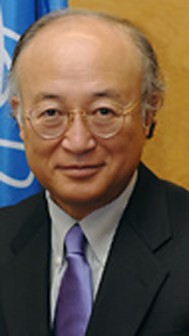VIENNA, (Reuters) – Iran appears to have worked on designing an atomic bomb and may still be conducting relevant research, the U.N. nuclear watchdog said in a hard-hitting report on Tehran’s nuclear programme likely to raise tensions in the Middle East.

Citing what it called “credible” information from member states and elsewhere, the agency listed a series of activities applicable to developing nuclear weapons, such as high explosives testing and development of an atomic bomb trigger.
The hotly anticipated International Atomic Energy Agency report, which was preceded by Israeli media speculation of pre-emptive air strikes on Iranian nuclear sites by Tehran’s arch-foe, detailed new evidence apparently showing concerted, covert efforts to acquire the capability to produce atomic bombs.
Some of the cited research and development activities by Iran have both civilian and military applications, but “others are specific to nuclear weapons,” said the report, obtained by Reuters on Tuesday ahead of an IAEA board of governors meeting.
Tehran, which has denied ever seeking nuclear firepower, immediately condemned the report. “(It) is unbalanced, unprofessional and politically motivated,” said Ali Asghar Soltanieh, Iran’s ambassador to the IAEA.
The United States and its allies are expected to seize on the document to press for more punitive sanctions on the major oil producer over its record of hiding sensitive nuclear activity and lack of full cooperation with U.N. inspectors.
“I think the facts lay out a pretty overwhelming case that this was a pretty sophisticated nuclear weapons effort aimed at miniaturising a warhead for a ballistic missile,” said prominent U.S. proliferation expert David Albright.
“It’s overwhelming in the amount of details, it is a pretty convincing case,” he told Reuters from Washington.
Russia criticised the report, saying it would dim hopes for dialogue with Tehran on its nuclear strivings and suggesting it was meant to scuttle chances for a diplomatic solution.
“We have serious doubts about the justification for steps to reveal contents of the report to a broad public, primarily because it is precisely now that certain chances for the renewal of dialogue between the ‘sextet’ of international mediators and Tehran have begun to appear,” the Russian Foreign Ministry said in a statement.
It said time was needed to study the report and determine whether it contained new evidence of a military element in Iran’s nuclear programme or was nothing but “the intentional — and counterproductive — whipping up of emotions”.





